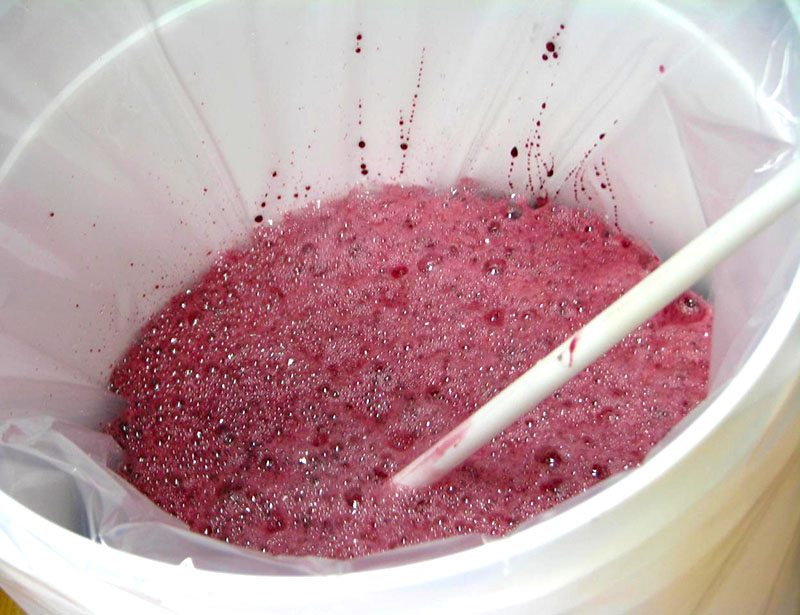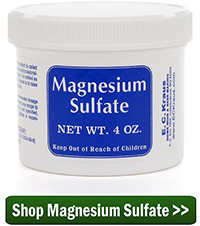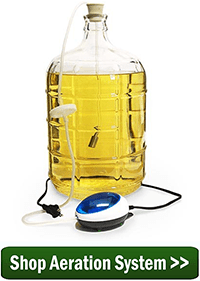 Your newsletter states that using distilled water for making wine is not recommended but what about tap water filtered via reverse osmosis? Can I use reverse osmosis water for wine making?
Your newsletter states that using distilled water for making wine is not recommended but what about tap water filtered via reverse osmosis? Can I use reverse osmosis water for wine making?
Thank You
John
____
Hello John,
You are correct. We do not recommend using distilled water. Not only does the distilling process remove valuable, free oxygen from the water, but it also removes all the minerals. Both are much-needed commodities for the yeast during a fermentation. If either are missing, it can lead to a sluggish or stuck fermentation.
Likewise, we do not recommend using reverse osmosis water for wine making, either. While the free oxygen does remain in the water through osmosis filtering process, critical minerals are still being removed. Magnesium sulfate can be added back to the water in an attempt to restore it for fermentation, but this is more or less putting a band-aid on the issue.
Your better option would be to purchase bottled drinking water. These bottled drinking water typically will either have the original, natural minerals in them, or the water has been completely purified and then had an optimal blend of minerals added back. Either way, this would be a better option than using distilled or reverse osmosis water in wine making.
It is also important to note that while free oxygen in the water is good for the fermentation, it is bad for the wine once the fermentation has completed. Having free oxygen in the wine after the fermentation can lead to oxidation or browning of the wine.
Fortunately, most all of the oxygen that is in the must before fermentation is either consumed by the yeast or quickly driven out by the CO2 gas from the fermentation. So, while we do recommend using water that is saturated in oxygen before the fermentation, after the fermentation, we recommend using distilled water for making any necessary adjustments or for topping-up after the fermentation.
saturated in oxygen before the fermentation, after the fermentation, we recommend using distilled water for making any necessary adjustments or for topping-up after the fermentation.
To sum it up, using reverse osmosis water for wine making is really not ideal, essentially because of that lack of trace minerals that are removed in the process. You would be better served in most cases by using tap water over reverse osmosis or maybe even bottle drinking water, if you are so inclined.
Happy Wine Making,
Ed Kraus
—–
Ed Kraus is a 3rd generation home brewer/winemaker and has been an owner of E. C. Kraus since 1999. He has been helping individuals make better wine and beer for over 25 years.

I have always enjoyed all the tips provided, however, I am not sure I can completely agree with your statement that using tap water is better than using reverse osmosis (RO) water. While I concur with the use of distilled water and that a loss in minerals from RO water can impact taste, so do locations with high mineral (hard water) and chlorine levels in their water. In fact, I have been to many places in the US where I can hardly stomach the taste of their tap water and can not image trying to make wire with it.
I have found that using RO water is results in my wine tasting far better than simply using tap water. I made many comparisons with wine batches using RO vs tap water. in each case, the RO water was much more desirable. For this reason, I added larger tanks for my home wine making.
I make about 100 gallons of wine a year for over 12 years, all with RO water and never had issues with fermentation. We’ve had several wine tasting parties with friends and family. Oftentimes, our home made wines are picked ask the “winner” over many commercially produced wines.
Perhaps it is best to say that it could depend on the tap water in your particular location and for others to try a batch with each type of water in your area.
Thanks for all your advise. It is very much appreciated..
Michael, you are absolutely right. That was a bit of an over-statement. Where we live — here in Independence, Missouri — the water is spectacular. It’s some of the best in the U.S. But I have been to many places where the tap water isn’t fit to drink, much less make wine with. So, you are right and “it depends” would be a better way to put it.
I have been using our tap water, but running it through a filter (like for a refrigerator) and had no problem. Second choice is to use spring water.
I have been using RO water for years and prior to that using bottled drinking water, and really have not noticed ANY difference in the quality of the wine I have made – usually about 7 gallons per year which most people I pass whatever I am making say they enjoy.
Just a thought.
What is the recommendation for water that is chlorinated or chloraminated but otherwise fine?
I wouldn’t recommend using chlorinated water. Some of that type of water I have drank seems like I’m drinking right out of a swimming pool. I use bottled spring water to my must for the fermentation. Once I do my first racking to a clean carboy, I then start using distilled water to top them off. I haven’t had any problems with my finished product. People I have given it to say it’s almost like buying it from the store.
The same can be said for beer making. RO water has no minerals that beer needs to taste good. Springwater is very good but if you use RO water you will need to add gypsum to your brew for better tasting beer. Chlorine is very bad for beer, use either sodium or potassium metabisulfite to sanitize bottles and equipment.
If you are worried about chlorine in the water several things can be done
Add a little sulfite, that will chemically remove the chlorine
Aerate the water will remove the chlorine this can be done by letting the water stand and your stir occasionally
Filter through a activated carbon filter this removes all organic including chlorine
About a week before I start a batch, I fill a carbon with tap water and place in the same room as I use to make and age the wine, therefore when I am ready to make the wine, chlorine is gone and everything is the same temp
If you do want to use RO water what minerals are recommended to add back in to the water?
The most important one is Magnesium Sulfate. As for a cocktail of minerals, I do not have any specific information on this.
I think I responded to the question of using distilled water to make up a must concentrate before, but I’ll repeat it since the question has come up again. First of all I don’t trust our tap water. As David Mucky wrote, it sometimes tastes like it was from someone’s swimming pool, so I’ve been using distilled water and have turned out some super wines. It seems that the concentrates we get contain all the contents of the original grape juice except most of the water (and perhaps traces of volatile organics). Using tap water or purified drinking water simply is adding additional minerals that are already in the must.
That brings up a question that I have always wondered about. How are the concentrates made? Evaporated under vacuum?
David, most wine concentrates are made under a vacuum.
Making good fermented beverages is, IMHO, a mixture of science and art. As a retired physical chemist, with 35 years of research experience, I feel good about the science part. As an amateur wine maker for about 50 years, I’m still learning. But as far as what kind of water to use, I believe that the mineral requirements of the yeast are met by whatever material that you are fermenting. Distilled water should be OK, if it is aerated before use, by vigorously shaking a partially-filled container. Actually, distilled water rapidly absorbs gases out of the air, simply sitting in an open container. Tap water can be a problem, in most areas of this country. Here’s a simple experiment. Take a gallon of your tap water, in a stainless steel pot, and boil it down to 10 or 20 ml (more or less, not critical). Examine the residue. Smell it. If possible, look at it with a microscope. I suspect that you will be shocked! When I did that with my tap water here in Southeast Iowa (recognized as high quality, meeting all specs), I was horrified. The brownish sediment smelled very bad. I took photomicrographs with my Zeiss research microscope, showing several kinds of sediments other than the expected CaCo3, and what appeared to be, filamentous algae. I sent them to our water plant, but they were not interested. Anyway, bottom line, again IMHO: RO water, which is what I use, should be fine; distilled water should be good, if aerated; Tap water should be used with caution, and tested, as above, if possible.
Agreed, that a good fermentation needs certain minerals to complete successfully. But why gamble on getting them from tap (or spring) water when a lot of “bad” things could be in that water. I use distilled water because it is 100% pure water molecules (no junk). Then I use a good nutrient like Fermaid to provide the yeast what they need for a successful fermentation. Years ago where I lived I discovered that when I switched from tap water to distilled water any wine where I had to add water (kits and fruit wines) jumped way up in quality.
Another practical article – thanks for sharing. Here in the city of Chicago, when I’m making wine from grapes or fruit, I tend to use a 50-50 mix of tap water left out for a day with RO water; usually, that gets added as a simple syrup, i.e. heated with with sugar dissolved into it. Nutrients/yeast energizer which seems to work well. For wine must from a bucket, when I use various additives like Bentonite or Sparkeloid I just mix with RO water.
I love drinking wine however if a wine product uses reverse osmosis water I refuse to drink it, I had a reverse osmosis machine in my home and and my husband became so sick from drinking this water the doctors could never find a reason why he had severe problems with his stomach he could not keep any minerals in his body, before you drink this water you should read what the world health organization says about it. I watched my husband suffer for 2 years and ultimately he passed away from aT cell leukemia I believe that the reverse osmosis water was the cause of this type of cancer to over take his body, he had every single synthom that the world health organization listed there is not enough research done in the United States on the use of reverse osmosis water. So please do the research and know what type of water you are drinking it could be deadly.